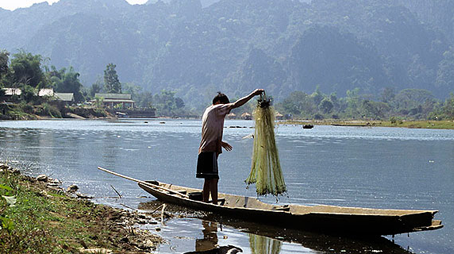| SEARCH |
-

Nov 17, 2015
Reflections on a three-decade legacy
The International Geosphere-Biosphere Programme (IGBP) will come to a close at t...
-
Nov 17, 2015
Use of and access to content on this website
Text and images produced by IGBP in house are free to use with appropriate credi...
-
Nov 12, 2015
Bella Gaia performance and panel discussion to mark IGBP's closure
A musical performance by Bella Gaia will celebrate the achievements and legacy o...
-

Towards Future Earth:
evolution or revolution?
During its three decades of existence, the International Geosphere-Biosphere Pro...
-
A personal note on IGBP and the social sciences
Humans are an integral component of the Earth system as conceptualised by IGBP. João Morais recalls key milestones in IGBP’s engagement with the social sciences and offers some words of advice for Future Earth.
-
IGBP and Earth observation:
a co-evolution
The iconic images of Earth beamed back by the earliest spacecraft helped to galvanise interest in our planet’s environment. The subsequent evolution and development of satellites for Earth observation has been intricately linked with that of IGBP and other global-change research programmes, write Jack Kaye and Cat Downy .
-
Deltas at risk
Around 500 million people worldwide live on deltas, but many of the world's deltas are sinking due ...
-
Climate change: the state of the science
A new data visualization released on the first day of the plenary negotiations at the UNFCCC’s clima...
-
Climate Change:
the State of the Science
Videos now online from the Stockholm public forum to mark the launch of the IPCC's climate report, 2...

Global Analysis, Integration and Modelling
GAIM aimed at the integration of the understanding flowing from the disciplinary-oriented core projects so as to provide a holistic understanding of planetary dynamics. This Task Force differed from an "IGBP core project" in that it was a group of scientists each conducting independent research which was coordinated and integrated through the GAIM International Project Office.
GAIM Objectives
- To develop a strategy for the rapid development, evaluation, and application of comprehensive prognostic models of the global biogeochemical sub-system which could eventually be linked with models of the physical-climate sub-system
- To propose, promote and facilitate experiments with existing models or by linking subcomponent models, especially those associated with IGBP Core Projects and with WCRP efforts.
- To clarify key scientific issues facing the development of global biogeochemical models and the coupling of these models to GCMs
- To assist the IPCC process by conducting timely studies that focus upon elucidating important unresolved scientific issues associated with the changing biogeochemical cycles of the planet and upon the role of the biosphere in the physical-climate sub-system, particularly its role in the global hydrological cycle.
- To advise the IGBP-SC on progress in developing comprehensive global biogeochemical models and to maintain scientific liaisons with WCRP Steering group on global climate modeling.
After more than a decade-long effort, achieving impressive results, GAIM was terminated in 2004, after providing the foundations for both the current Global Carbon Project (GCP) and the building the platform for the new generation of integrative modeling activities in AIMES (both under IGBP-II).
GAIM International Project Office was kindly hosted by University of New Hampshire, Durham, USA with generous financial support from NSF, NOAA, EPA and DOE.
IGBP closed at the end of 2015. This website is no longer updated.
-

Global Change Magazine No. 84
This final issue of the magazine takes stock of IGBP’s scientific and institutional accomplishments as well as its contributions to policy and capacity building. It features interviews of several past...
-

Global Change Magazine No. 83
This issue features a special section on carbon. You can read about peak greenhouse-gas emissions in China, the mitigation of black carbon emissions and the effect of the 2010-2011 La Niña event on gl...
-
INTERGOVERNMENTAL PANEL ON CLIMATE CHANGE:
How green is my future?
UN panel foresees big growth in renewable energy, but policies will dictate just how big.
-
UK:
'The Anthropocene: a new epoch of geological time?'
Royal Society, Philosphical Transactions A




















